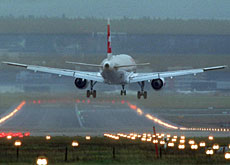
Aviation deal fails to get off the ground

The Swiss Senate looks almost certain to throw out a controversial aviation deal with Germany, setting the stage for an escalating diplomatic row with Berlin.
A Senate commission said the agreement – which limits flights into Switzerland’s main airport at Zurich – gave too much away.
The Senate is likely to follow the commission’s advice by refusing to ratify the deal during the March parliamentary session.
The commission urged the Senate, by 8 votes to 3, to scuttle the agreement.
The accord would have significantly cut the number of flights into Switzerland’s main airport at Zurich, as part of a plan to limit noise pollution over southern Germany.
Thursday’s commission decision is the second blow in a week for the Swiss transport minister, Moritz Leuenberger, who brokered the accord.
At talks in Berlin on Monday with his German counterpart, Manfred Stolpe, Leuenberger was told that Germany would not reopen negotiations to make changes to the accord.
Switzerland is now bracing for Berlin to establish even tougher rules for the Swiss than those enshrined in the accord.
Noise pollution
Leuenberger negotiated the accord with Stolpe’s predecessor, Kurt Bodewig, in October 2001, but was widely criticised at home for giving too much away.
Both sides agreed to cut by a third the number of flights permitted to use airspace over Baden Württemberg in southern Germany before landing at Zurich – which is less than 20 kilometres from the German border.
The agreement, which was heralded as a way of reducing noise pollution in southern Germany, would mean a drop from 150,000 to 100,000 flights per year.
It also includes a ban on night and weekend flights.
The Swiss business federation, the national carrier Swiss, the cantonal government of Zurich and the operators of Zurich airport are all against the deal. They say it discriminates against Switzerland and does not conform to European Union regulations.
Last October, a German court threw out an attempt by Swiss and Zurich airport to overturn the deal.
Berlin’s refusal to give way has led to demands for retaliatory action – the rightwing Swiss People’s Party has called for restrictions on German trucks crossing into Switzerland.
Refusal
Switzerland’s House of Representatives has already refused to ratify the accord.
The Senate put off making a decision in the last parliamentary session – sending it back to the commission.
Thursday’s recommendation by the commission means the Senate is also likely to vote “no” – a move that would scupper the whole deal and herald the threat of unilateral action by Germany.
Germany has already threatened that it will impose even tougher restrictions on flights over its airspace if the Swiss do not ratify the accord.
Flights into Zurich going over southern Germany would be reduced to just 80,000 a year.
Germany would also take over control of air traffic in Baden Württemberg posing a threat to Switzerland’s own air traffic control operator, Skyguide, which would stand to lose millions of francs.
Stalemate
The Zurich cantonal government could hold the key to ending the stalemate. If it were to change its mind and recommend ratifying the accord, the Senate could well follow suit – regardless of the commission’s recommendations.
The Senate, which is composed of two representatives from each canton, tends to take into consideration cantonal decisions before it takes a vote.
The cantonal government is due to convene next week, although the signs are that it will not budge from its current position.
The lower chamber of the German parliament has already ratified the agreement. But it was rejected by the upper chamber and, according to the president of Baden-Württemberg Erwin Teufel, it will be blocked again unless changes are made.
Germany’s lower chamber has the power to enforce the accord by voting for it again, but that decision will only be taken once the Swiss parliament has ratified the accord – a step that now looks unlikely.
swissinfo, Jonathan Summerton
The Swiss Senate looks almost certain to throw out a controversial aviation deal with Germany, in a move that could unleash a diplomatic row with Berlin.
The accord was agreed in October 2001 by Switzerland and Germany’s transport ministers.
It would cut the number of flights over southern Germany into Zurich from 150,000 to 100,000 a year.
The Senate is due to vote on the deal in March.

In compliance with the JTI standards
More: SWI swissinfo.ch certified by the Journalism Trust Initiative






























You can find an overview of ongoing debates with our journalists here . Please join us!
If you want to start a conversation about a topic raised in this article or want to report factual errors, email us at english@swissinfo.ch.